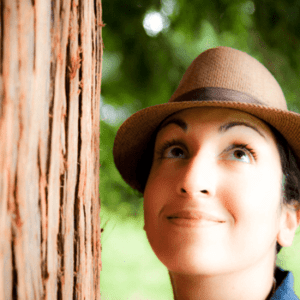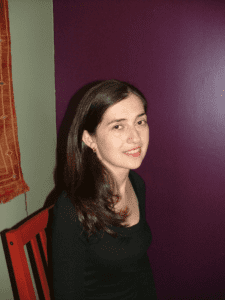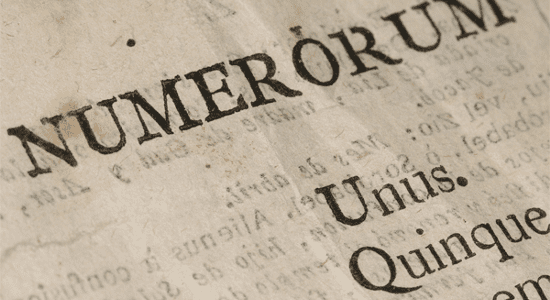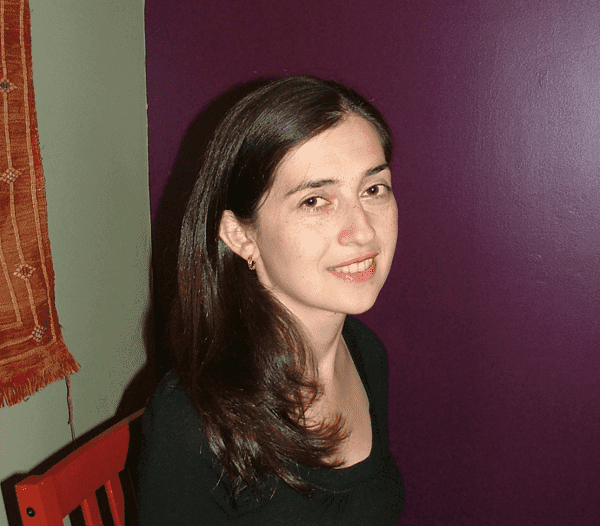The silver pieces from my father’s leather purse never run out while I pump them into the empty vending machine for longer than I can remember and though each coin I insert makes my flesh grow thinner like rain on paper my skeleton stands eternal condemned to an infinite glowing like that stale light from the droning vending machine at the end of this dark hallway where deactivated bulbs emit alternating currents of dis orieNt AT ION through this hotel in the common cold after a blackout where from haunted balconies flashes of lightening in the night look tangibly present and deeply frightening.
Shorthand
Accordion
Michael St. George taught me this exercise when we taught a series of spoken word workshops together.
Take a piece of paper and write one line at the top of it. Pass it along to the next person. That person reads your line, folds the paper to cover your line, and responds with a line underneath it. The next person does the same . . . and the next . . . and the next . . . until the poem is complete and the entire paper is folded. Open the paper like an accordion and read it aloud. It’s amazing to see what we can do with the inspiration of one line, and how a poem can be created through collaboration and trust!
The Sea within Me
And so I wait to find some reasoning to pull me under—to allow the waves to grab hold of me and push me out into the ether of the ocean. And I will drown until sand tangles my hair and salt pumps through my veins. I will let my skin soften until it wrinkles like silk after sitting.
There is nothing more fearful than swimming in a sea that is destined to make you sink.
I can see the shore, the horizon blurring itself over blue. I can see the fray between water and land, the fine foam lace frothing on the beach. I know the ocean is perfectly calm when I reach the middle . . . if I hold my breath, if I refuse my foot from reaching the bottom.
I can close my eyes to breathe in the sun. I can let my limbs deaden into clay, numb themselves to touch. I can close my ears to the screeching of seagulls. The only voices left are the banging of my heart and the waves slapping my skin.
I fear water. I fear water because I cannot dig my toes into soil, because there is no ground to break the fall, no ground beneath the fall.
Author of the Month: Sheniz Janmohamed
Tell us about yourself.

I’m the kind of writer who thinks more about writing than actually writing. Perhaps this is the dilemma of all writers. Instead of writing, I enjoy buying books I never seem to finish. I also enjoy searching for earrings I don’t need on etsy.com (visit with caution), drinking earl grey lattes, downing coffee and organizing poetry events. I have a passion for vegan chocolate brownies. I think one of my thesis advisors was right when she said that I focus too much on food in my writing.
Other than eating and drinking delicious things, I write poetry and am attempting to write a novel. A novel whose characters seem to elude me. I’ve just returned from India, where I performed spoken word in front of an audience of 1500+ people at the Jaipur Literature Festival. It was maddening, exciting and surreal. And the chai was damn good.
My first (and hopefully not only) book, Bleeding Light, was published in 2010 by TSAR Publications. It’s a collection of poetry written in ghazal form. The ghazal is a stunning, complicated form of poetry that has its roots in Farsi, Arabic, Urdu and Hindi, to name a few. Since I can’t write in any of those languages, I write in English. Etymology excites me because I uncover the hidden meanings and origins of words—which, for a poet, is like discovering treasure.
I could list all my performances, publications and accomplishments, but that’s exhausting to write and to read. I’d rather end with some recommendations—read poetry, eat well, go for long walks, take criticism with grace, take compliments with humility, and don’t forget to breathe.
When did you realize you had a passion for writing?
I loved writing when I was little—I used to write poems but called them ‘polems.’ When I was 13, I realized that I wanted to be a writer/author, and that’s really where the journey began.
What pieces of writing/authors have had the greatest impact on you?
There are so many writers/poets that have influenced me. They seem to change as I grow and change. Gibran was my first love. I also fell in love with T.S. Eliot and Carl Sandburg. The love affair continued with sufi poets, particularly Bulleh Shah, Rumi, Hafez and Mirza Ghalib. A friend introduced me to the ghazals of Agha Shahid Ali and no one has, or can, match him in his mastery of the ghazal in English. I am in awe of his writing. Rishma Dunlop’s The Body of My Garden became a staple in my purse for most of my first and second year of university. If I could write novels, I would want to write like Elif Shafak (40 Rules of Love). Sartre’s Nausea is full of gems. Borges is magnificent, particularly “The Aleph” I’ve also read and re-read Emerson’s essays and insights. I recently discovered the poetry of Mary Oliver, which is luminous.
How and when do you find time to write?
I’m still trying to figure that one out. I have a hard time writing on the computer because I get tempted to surf the internet, so I have an old school notebook that comes with me wherever I go. I wish I could be like my friend and fellow author, Ava Homa, who religiously sets aside time to write daily. Hopefully I will get into the routine of writing daily, instead of waiting for the inspiration bug to bite me.
What has been some of the biggest challenges you’ve faced as a writer?
I think being a writer is a challenge in itself. Every time we pick up a pen, we experience challenges. I write to come to terms with challenges in my life, or to meet them head on. There are too many to explain here, and I think my poetry would do more justice to the question than this response.
How have you changed as a writer over the years?
When I was younger, writing was a means to understand and explore my identity as a minority. I needed to understand my heritage, ancestry, religion and race. I wanted to ‘belong.’ After exhausting the topic, I have come to the conclusion that I don’t have to ‘choose’ to be ‘this’ or ‘that.’ I can be all of it, at once. Labels are limiting. I identify first as a human being, and this has changed my perspective of myself and the way I look at the world . . . which of course, manifests in my writing.
Searching for Latin
I want to understand why you loved Latin more than people. I had been trying to reconnect with you for years, enrolling in one Latin class after another, resuscitating my declensions and mental agility to parse convoluted syntax, even dedicating my senior undergraduate paper, Ovid’s Voice in Exile, to your memory. I never told you, though, that by that point I had to resort to reading with a facing English translation next to me. My Latin had become an approximation of language, a series of distant memories of adjective and noun endings.
For two years, I spent Thursday afternoons sitting at your dining room table, with Horace or Virgil between us, and the only questions I ever asked you were the gender or meaning of a particular noun. Every so often, you punctuated grammar explanations with an anecdote about growing up with a hateful grandmother in Brantford, an hour’s drive from Toronto but a universe away. Were there others like you, Brantford students, who favored Greek and Latin over high school parties?
I drive past your old condo building on Broadview Avenue on my way to my parents’ house and back home again. I consider it luck that I don’t have to see your windows, since they all face the Don Valley and I never have to confront the fact that you’re no longer standing in your dining room, drinking beer warmed in the microwave from a white mug with an uppercase P on it.
“It’s my favorite mug,” you once told me. “Do you get it? ”
I stared at the P.
“The Latin P is for Payne and the Greek ‘Rho’ is for Ron,” you said, smiling to yourself, marveling at the fact that a P could have a “p” sound in English and an “r” sound in Greek, and that you had found a mug with both of your initials written in one letter. Ron Payne. “Come on, you knew that!”
Whenever I come across a capital P now, I wonder how many people know that a P is also an R in disguise.
You announced that you were leaving school one day in the beginning of May, when I was in your grade 11 Latin class. A medical emergency, you said. I watched as your yellowed, calloused fingers combed through your thinning white hair, and wondered how old you were. When you died, two and a half years later, I deduced from your obituary that you had then been sixty-one.
When I told my parents that you were going straight into surgery for advanced cancer, they informed me that I would visit you in the hospital. And one day, without my knowing, my mother called your room to assure you that I wanted to continue reading Latin with you, and would it be ok if I visited you at home once you were discharged.
“But I don’t have time to see him,” I said
“You’ll make time. Two hours a week is nothing to give a dying man,” my mother told me.
“I don’t need the extra Latin practice. I’m getting a good mark.”
“I already said you’d be there next Thursday. Believe me, you’d regret this in a few years if you didn’t see him.”
There is no arguing with my mother. She often speaks to me in her prophetic, oracular conditional mood, informing me exactly what could happen a few years from now, if I fail to heed her advice. She knew nothing about Latin and had never even been to Rome, but she must have gleaned, from the parent-teacher interview she had with you, that two hours of parsing through Latin texts with a somewhat enthusiastic student would bring you more pleasure than an infinite number of cans of chicken soup—the only other recipe she knew for curing illness.
We settled into a routine, and by our second meeting, I was comfortable with your slurred speech, and the drool hanging down your scarred chin, still raw from surgery, didn’t faze me. Every Thursday, I sat at your dining room table from 4 to 6 pm, staring down at the bed of trees below us when I needed a moment to remember a word. You taught me to read dactylic hexameter and how to distinguish long syllables from short ones. I can no longer read Virgil, but to this day I remember that the fifth foot in a line of dactylic hexameter is always a dactyl—long, short, short—and the sixth can end in either a long or short syllable. Whenever I pass your building, I see a string of syllables in my mind, and find myself separating it into feet, sorting through long and short syllables and drawing caesuras.
You’d offered me your books, and I said I’d take them eventually, next time. From your eighteenth floor dining room windows, autumn resembled a multicolored cushion, resting beneath us, and I was positive your library would wait.
You lived alone your entire life, and yet you always bought two subscriptions to the opera. You took me to the opera and slept through Don Giovanni because it was right after your chemo treatment. You didn’t notice that next to you, I too slept through the entire second act. Or if you noticed, you said nothing. You traveled to Russia the summer before you died, when you had a momentary glimmer of strength, and came back enthralled by the churches. You showed me photos of wooden cathedrals in Kizhi built without a single nail, of monasteries near Moscow, of the famous onion domes that punctuated the Golden Ring. You had me translate a few brochures from Russian. You didn’t ask me where I had been born. I didn’t volunteer the information.
That same summer, I documented my first trip to Europe alone by sending you postcards from Paris and the Loire valley. I might have quoted Horace, might have provided you with historical facts about one medieval church or other, politely enquired about your health, joked about your tepid beer, alluded to your evil granny (because I knew the comment would invite a smile), or embarrassed you by constructing a hopeless sentence in Latin, with the endings all garbled.
“Thanks for the postcards,” you said. “Your Latin is peculiar, but you sure write well in English.” I expected you to go through my postcards with a red marker, the way you would have done if you were still my teacher. Instead, you added, “you pack a lot into a postcard.”
One day, while I was scanning a line of Virgil to find an adjective to match the noun’s ending, you told me that Thursday had become your favorite day of the week. “Because you’re here,” you said. I didn’t respond, and must have stared out the window, at the trees below; autumn had definitively given in to winter.
“Why did you decide to become a Latin teacher? ”
“I wanted to make sure I’d never have to return to Brantford.” I don’t know if those were your exact words, but it’s what I remember hearing. I was in the process of applying to university and was eager to carve out a new existence for myself. I read everything I heard as an escape narrative.
Emerging Author of the Month: Julia Zarankin

Tell us about yourself.
Julia Zarankin is a Toronto-based writer. Her creative nonfiction has appeared in Threepenny Review, Antioch Review, Dalhousie Review, PRISM International, and The Globe and Mail. She was long-listed for a CBC Literary award in nonfiction (2011) and an essay called “Leaving the 18th Floor” is forthcoming in Truth, Dare, Double Dare (Goose Lane, 2014). She currently blogs about birds and words at Ontario Nature. In her former life, which ended in 2008, Julia worked as a Russian literature professor at theUniversity of Missouri.
Tell us about the piece you’ve decided to share.
This is an excerpt from a piece that began as a letter to my deceased Latin teacher. It’s about themes that permeate my writing: language, dislocation, nostalgia, yearning for an understanding of one’s past, mysterious connections. This piece appeared in the Antioch Review in 2011.
When and why did you realize you had a passion for writing?
It started with a compulsion to write letters and diaries—when I was a teenager, I must have written at least ten letters a week. I was seriously obsessed. It must have been at that time that I realized writing calmed me down and made the world around me more comprehensible; when I wasn’t writing, I didn’t quite feel like myself. I’ve always been fascinated by my immigrant identity; early on, I started writing about my family, and they continue to inspire me in their strangeness, their tenacity, their fearlessness, their success in making a home for themselves in a new country, and their captivating identity, which I’m constantly striving to understand.
What pieces of writing/authors have had the greatest impact on you?
I keep turning back to Anton Chekhov. I don’t think there’s anyone else like him who can make you laugh and cry at the same time. I reread Tolstoy for his expertise in the human body—I don’t think there’s anyone else who can describe involuntary physical responses as well as he can. These days, Isabel Huggan, Jonathan Franzen, Alice Munro, Maureen Stanton, Jhumpa Lahiri, Virginia Woolf occupy coveted space on my bookshelf.
What kind of writer do you aspire to be?
One who works hard to craft memorable sentences and who never tires of the rhythm of language.
How and when do you find time to write?
I’m a freelancer and have the luxury to keep my mornings free and reserved for writing. Still, it’s discipline and it’s work, and I use a computer program called FREEDOM to keep myself off the internet during writing hours. The question, for me, isn’t about finding time to write, but about making sure you use the time you have.






